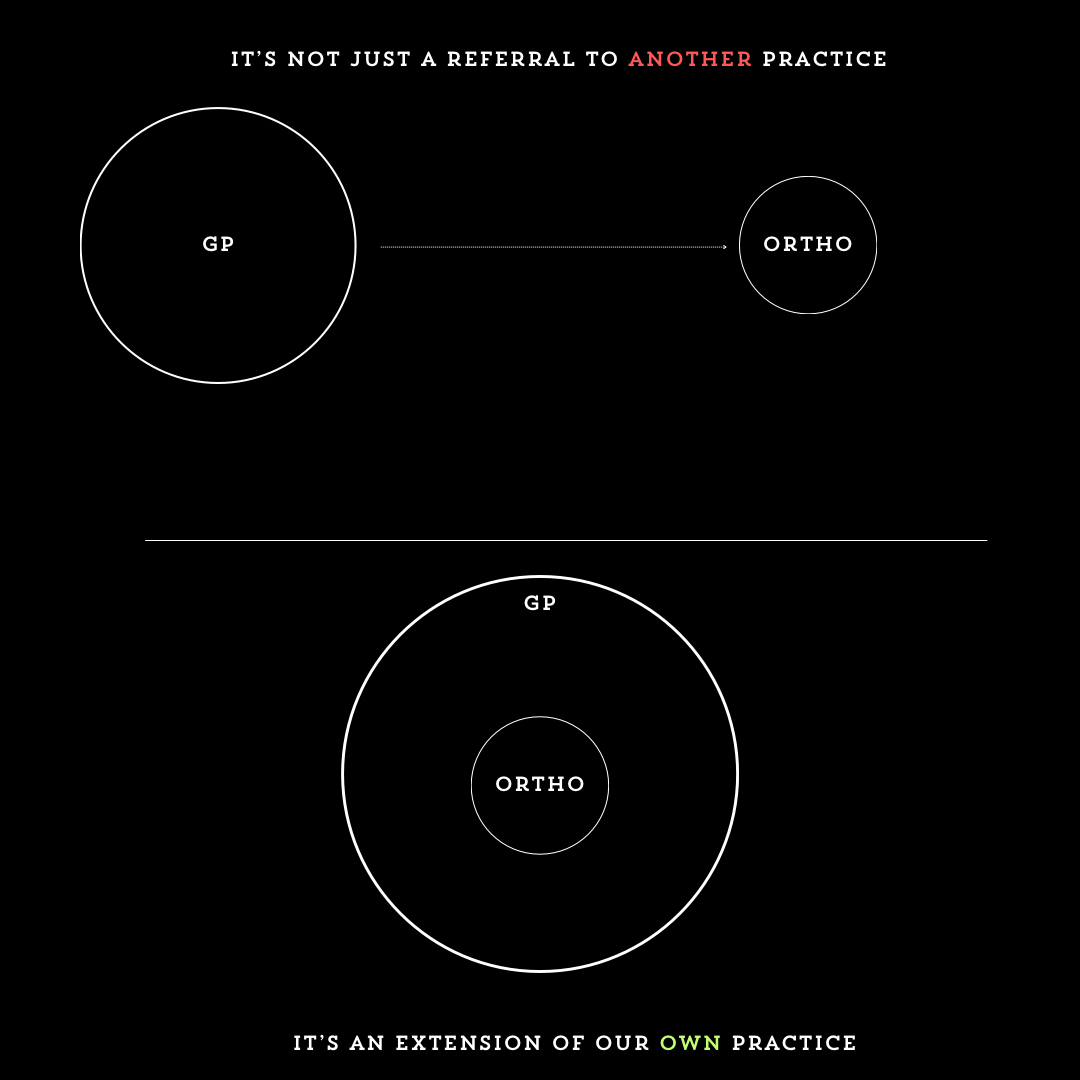- The Moment
- Posts
- Treatment Over Treats
Treatment Over Treats
Co-authored with Phil Rickaby
Read time: 7 minutes.
At a glance:
Quote:
Picture
What I’ve Learned
Business Idea
The only practice you’re destined to have is the practice you’ve decided to have.”

If there was ever a year for boosting orthodontic referrals, 2024 has first rights.
The industry has never had three consecutive down years, and we’re on track to make history. But instead of waiting for things to turn around, we decided to take matters into our own hands.
Generalists and pediatric dental referrals are commonly the second largest, if not the largest, revenue source for orthodontists. But what drives them to pick a particular practice? Do the treats work? When was the last time an orthodontist asked for referrals?
This week, we went deep with a highly respected fee-for-service general provider, asking 20 questions on what drives their referrals. Based on our interview, we intend to arm our orthodontists with actionable insights to deepen relationships and drive revenue the next time we talk with our providers.
Demographic: Large fee-for-service general practice in the suburbs of Ohio. We are keeping the name and provider private.
What do you instruct your hygienists to say when patients ask their opinion on orthodontic practices? First, we have an idea of the philosophies of our referrals - notably with expansion, airway, and their appliances. And we talk about these things with our staff. If it’s your run-of-the-mill 12- or 13-year-old, the team is allowed to speak to any recommendation. But we look for certain providers if there are more specific profiles - with adults or children. So, it’s dependent on what the patient needs.
So, you chose referrals based on the case type? Yes, but some is talking to the patient and getting to know their personality. We’re 100% fee-for-service, so we tend to attract patients for whom the cost of treatment is not the sole factor in choosing where they get their care. Certain cases fit better with certain orthodontists based on the patient’s and orthodontist’s personalities, and on the patient’s specific needs for the case.
How do you learn an orthodontist’s philosophy, and what cases do they excel in? Through study clubs. But some of it is finding out after the fact: our patients come back, and we hear from the patients what they said and see what happened - especially with expansion. We do specialty work, too. When we have a better understanding of what the patient is going to go through, we can educate our patients so that when they visit an ortho, they know what to expect and already have a good idea of the time frame and process of treatment. It gives the patient a better understanding and eliminates confusion. I like to think that it also makes the life of our orthodontists easier.
Sounds like communication is key? Yeah, totally. When we introduce a treatment plan, it should also coincide with their treatment plan. What we don’t want is two completely different plans.
Do you have a story about poor communication? Once, I spent 30 minutes with a patient, going through all their options, and the patient told me what they wanted. We agreed on a path.
So, I referred them and sent them on their way. But this patient went to a different referral partner—one I’ve never worked with—and she came back, and I got a letter that all her teeth would be removed. I said, “Whoa, whoa, whoa … that’s not what we discussed!” And what’s worse, I was given no communication.
I brought the patient back to discuss their new plan in detail, and the patient said, “I don’t want any of that.” So she went back and figured out more information.
…All the while, the providers still hadn’t gotten back to me.
Now, I had to have a third appointment with the patient, and we are having the same conversation! It was a giant waste of time for everyone. Three or four no-charge consults discussing the same thing is not profitable for anyone.
This is something I don’t want with any partner.
Does the orthodontist change their TX plans on you? Yes. If we’re setting up a case for restorative, and the orthodontist completely changes it, yes, it happens. Same stuff. I’ve talked to orthodontists and said, “I need you to intrude these teeth… and they finish without doing any intrusion - the communication can be rough.”
Communication is absolutely the theme here? Absolutely. One patient needed work, had a bunch of erosion on her incisors, was mid-treatment, and now she needs crowns—there’s no enamel left. I came to find out that the orthodontist was setting up a perfect occlusion on her dentin. Now, I have six potential root canals to deal with.
What does good education look like? One group holds a CE event annually and speaks about what they do. Focusing on expansion, how they know when to treat, their protocols, and when to monitor. It is super helpful. It gets all the dentists on the same page.
Do you read orthodontic letters? I do. A normal, run-of-the-mill letter is fine. If it's out of the box or weird, text or call me.
Do you know your orthodontists’ fees? I have a general idea, but not exact.
Has that ever come up? It’s happened only a few times.
Have you been directly asked to change your referrals to a new practice? I've never had anyone ask me directly. I’ve had one come in and get to know me when I first bought the office - but no one has directly asked me to refer to them over another. Back when we opened years ago, some stepped foot in our practice. We had a specialty friend - who now has an associate - to whom we were referring, but the experience with the associate wasn’t great, which reflects poorly on us. They haven’t visited since, and we’ve changed our referral pattern.
Do the fruit plates, treats, and snacks influence you or the team? No. I would rather have a similar treatment style and excellent communication over cookies.
Do your peers ever change their referrals based on dropped gifts? It’s nice, but no. I want the conversation and comprehensive care, not a fruit basket at Christmas time.
Do you not refer to someone for a specific reason? One guy is arrogant, and I refuse to refer to him. His bedside manner is awful.
What new technology has been shown to you by an orthodontist? We’ve seen a little clear aligners stuff, but that’s as far as new tech goes. Sometimes, we see from our patients. I once looked at a new bracket on a patient and said, ‘This looks weird’ - and I had to ask the orthodontist what it was. We mostly learn about new technology advances during discussions on how to treat specific patients and what can be done with the orthodontist.
So you found out new technology through the patient? Yeah… sometimes it’s through the patient.
What are your pet peeves from referral partners? Lack of communication, not treating second molars - many orthodontists don’t treat 2nd molars and leave them out there, throwing brackets on someone with terrible oral hygiene because they’re worried about getting the start…I’m like, ‘Why are you even in ortho - have you ever seen a dentist in the last ten years!?’
What else would you want to add? I love to know their knowledge on how they operate; I want to know what cases they can do with aligners and other treatments that make them different; I want to see if they can get certain cases done and some perspective so I can give a rough ballpark of their treatments and philosophy. We rely heavily on technology to provide the best experience for our patients, so we tend to refer to specialists with similar philosophies and treatment styles. We want our patients to have the same great experience we’re offering. If we’re referring them, it’s our reputation on the line. The orthodontic practice experience is an extension of our own practice experience.
